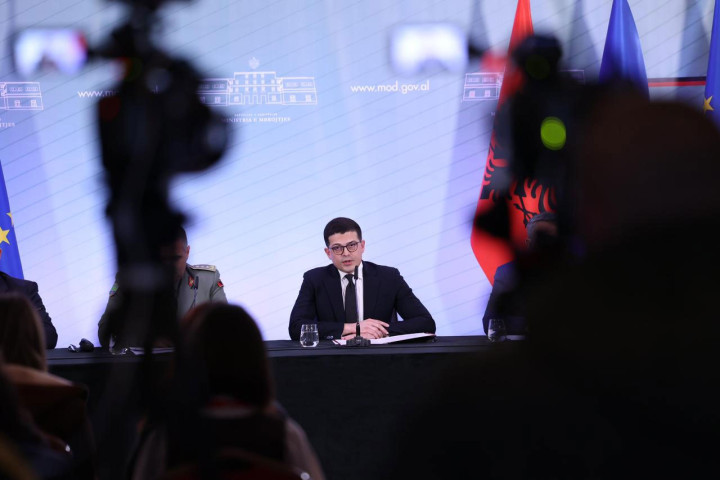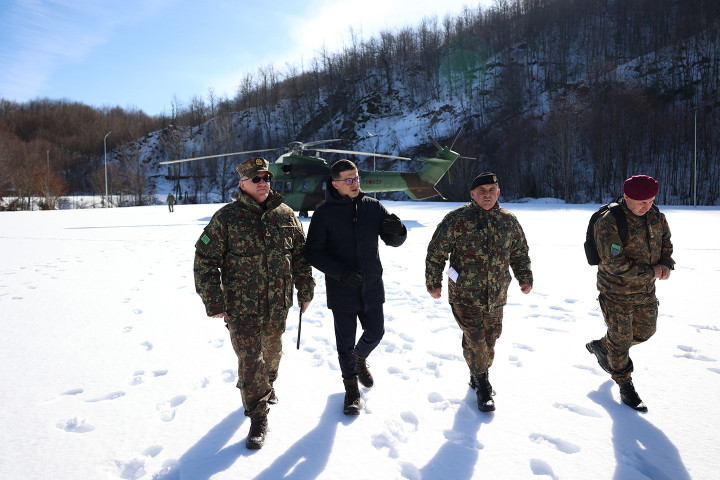NATO Resource Conference
-
Published: Thursday, 27 March 2014 16:11
At the “Tirana International” Hotel began its proceedings the NATO Resource Conference 2014. The purpose of this conference is to support and build confidence in the use of common funds, to create knowledge, understanding and support for the ongoing work of the NATO HQs, as well as promote the growth of effective cooperation between different views and concerns of states member.
At the conference opening attended Defence Minister, Mrs. Mimi Kodheli, Chief of General Staff of the Armed Forces, Major General Jeronim Bazo, Deputy Chief of Staff of Allied Command Transformation (ACT), Major General Saleh Sevil, Major General Albert Husniaux, NATO Chief Scientist, as well as military and civilian representatives from NATO member countries and partner countries.
Defence Minister Mrs. Mimi Kodheli, addressed the conference stating:
“It is my and our honour and pleasure to host the Fourth NATO Resource Conference in Tirana Albania. This event coincides with the fifth anniversary of the Albanian accession to NATO. This event coincides too with the latest developments in international affairs, culminating with the Russia-Ukraine Crisis.
Since the end of the Cold War, we all have been witnesses of a fast pace changing world, in political, economical and geopolitical terms. We are facing new threats to the world security and stability and therefore a real need to change for NATO. NATO’s forces have undergone a remarkable transformation but still the Alliance must invest in improving capabilities to deal with risks and challenges like terrorism, piracy, regional instability and missile and cyber attacks.
I understand that this conference has been very productive in the past. Not only does this conference provide a forum to reflect on the work that has been accomplished, but it will discuss issues that will affect the resource community in the near term. As such I hope that this conference will contribute to the progress towards the Wales Summit later this year.
Many of our Allies have been affected by the economic crisis. While some of our Allies’ economies are recovering, not all of us are at the same pace of recovery. Most of us have seen a decline in resources made available for governmental spending, the effect on defence spending most likely will be long lasting.
We firmly believe in a fair burden sharing and a reasonable challenge regarding the targets that we will be assigned and accept as part of the NATO Defence Planning Process.
Governments will have to prioritize the spending of public funds, and spending on defence has to compete with spending on education, fighting unemployment, health care and other public services.
Albania joined the Alliance only 5 years ago, and has made significant progress as part of our integration process, which was completed late last year. This year will mark an important year for our armed forces as we will be engaged in finalizing the National Security Strategy, the compilation of the Military Strategy, the Long Term Development Plan of the armed forces and last but not least a review of the Armed Forces Structure. Structural reforms and fight against corruption are our main goals. These efforts aim to have a more efficient, functional and able administration and a defence organisation capable for its collective defence mission and support to civil emergencies.
Like many of you, we are facing tough choices when we discuss maintaining existing capabilities and procuring new capabilities and modernizing our forces. Issues like:
• economical life expectancy of existing capabilities,
• costs of new capability in terms of both investment, annual maintenance costs and required personnel,
• affordability within our budgets and medium term planning,
• best investment strategy,
• Industrial benefits and employment;
• Efficiency in using taxpayers money.
I believe that we are able to develop innovative solutions to most of the questions raised. Life-cycle or through-life costing methods, sharing of responsibilities and pooling of assets, cooperation amongst the sovereign nations of the Alliance, clear political guidance on priorities matching the required capabilities, resources / time-dimension and specialisation could alleviate the resource burden of the Alliance as a whole and the individual Allies.
We are currently in a programme of upgrading the equipment for our forces while we are seeking to obtain the most capabilities for the resources available.
Collectively I think that we can obtain efficiencies in certain areas. Training is one of the areas where we can achieve economies of scale. Some of us cannot afford to set up specialized training for every aspect of our training requirements. We should be able to send our military to NATO or other Allies training facilities, or even to partners. This would provide savings for the sending nations as well as centres of excellence and subject matter expertise for the receiving educational institutions.
We embrace the idea of Smart Defence and the Connected Forces Initiatives. We are engaged in a number of Smart Defence Projects and have high expectations of an efficient and effective programme of individual and collective training and exercises.
Concluding and by wishing a successful conference, I would like to stress the importance of this event in providing a unique opportunity for key national decision makers across all resource areas, to obtain valuable insight in achievements and challenges as well as work carried out so far and ongoing discussions not only within the NATO Resource Communities but on a broader context also.
It will also provide an excellent opportunity for a frank exchange of views, clarification of positions and identification of challenges and potential risks that lay ahead.
Thank you and I wish you a fruitful conference and a nice stay in Tirana.”
Then, the conference proceedings continued in sections, discussing various topics like: from deployment to deployments, operations in the future, main tasks and core capabilities including force structure, cyber defence, joint intelligence, surveillance and reconnaissance; education, training, exercises, assessments and initiatives for Joint Forces: a new vision for NATO common funding, etc.
NATO Resourse Conference 2014 will close its proceedings on March 28, 2014.
Articles from Newsroom
Monday, 26 January 2026



Defence Minister Vengu hosts Belgian counterpart: Cooperation to strengthen our capabilities
Tuesday, 20 January 2026
Albanian Air force trains with the U.S. Air Force, focusing on rapid crisis response
Monday, 19 January 2026